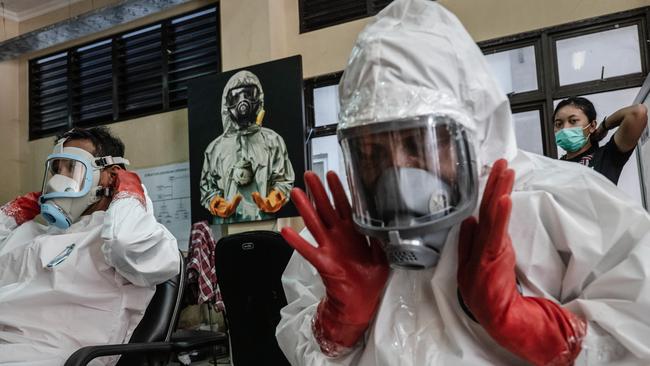Red flags as Indonesian university claims it has COVID-19 cure
An experimental Indonesian drug treatment for COVID-19 patients has drawn scientific scepticism amid fears it is being fast-tracked without full clinical trials.

An experimental drug treatment for COVID-19 patients — hailed by the Indonesian military, national intelligence agency and university that jointly developed it as a potentially world-first cure for the virus — has drawn scientific scepticism amid fears it is being fast-tracked without full clinical trials.
Mohammad Nasih, rector of Airlangga public university which led the research, has said the treatment — a combination of existing drugs including HIV medicine lopinavir, anti-malarials doxycycline and hydroxychloroquine and the antibiotic azithromycin — is ready for “immediate” national distribution.
The World Health Organisation last month recommended against the continued use of hydroxychloroquine and lopinavir for COVID-19 treatment because of a lack of significant results, and after hydroxychloroquine triggered heart abnormalities in certain patients.
But Professor Nasih said his researchers found certain combinations of the drugs were up to 98 per cent effective in treating Indonesian COVID-19 patients.
“After we combined (these drugs), the healing power highly increases and is good,” he told a weekend press conference at Jakarta’s army headquarters.
“Of course, it will result in a new remedy that is expected to be the first COVID-19 cure in the world.”
A group of high-ranking officers, including the army chief of staff and deputy head of the intelligence agency, were poised to submit the proposed treatment combination for approval with the national food and drug monitoring agency on Wednesday.
Indonesia’s conspicuously militarised approach to handling the pandemic has already raised eyebrows, with analysts noting prominent roles allocated to active and retired Indonesian military officers, including the national COVID-19 task force and economic recovery unit.
University of Indonesia epidemiologist Pandu Riono told The Australian that having senior military, police and intelligence agency generals submit the proposed treatment for approval with the country’s FDA could be seen as intimidation or an “abuse of power”.
Professor Pandu also accused the consortium of bypassing standard approval processes, which require clearance from the National Institute of Health Research and Development.
Zullies Ikawati, a senior pharmacology lecturer at Indonesia’s Gadjah Mada University, said she too was concerned at the lack of information or published study on the treatment, which the consortium says was tested at Airlangga hospital in Surabaya, a Bandung military academy where a COVID-19 cluster broke out, and a Jakarta police hospital.
“It is a pity (because) we all want to be optimistic, but by rushing into something like this it just shows that it’s not well-researched or trialled properly,” Professor Zullies said.
“We don’t know the severity of the cases of patients in the clinical trial. We don’t know their ages or which patient was given which medicine. Airlangga is a reputable institution so it’s very disappointing to see such sloppy work from them.”
Asked about the controversial new treatment late on Tuesday, Indonesia’s COVID-19 task-force spokesman Wiku Adisasmito also noted the consortium had yet to say what clinical trials were done, or the results.
“Transparency is very important so now Airlangga, with the support of military and intelligence agency, should not mind explaining how their trials were conducted and the process with the (Airlangga university) ethics committee” which approved the treatment, Professor Wiku said.
“The clinical trial must be done according to international standards. Until now this medicine has not received distribution permit because it is still in trial stage.”
The latest claim by an Indonesian state institution to have found a COVID-19 cure comes three months after the Agriculture Ministry said it had developed a eucalyptus-based “antivirus necklace”.



To join the conversation, please log in. Don't have an account? Register
Join the conversation, you are commenting as Logout